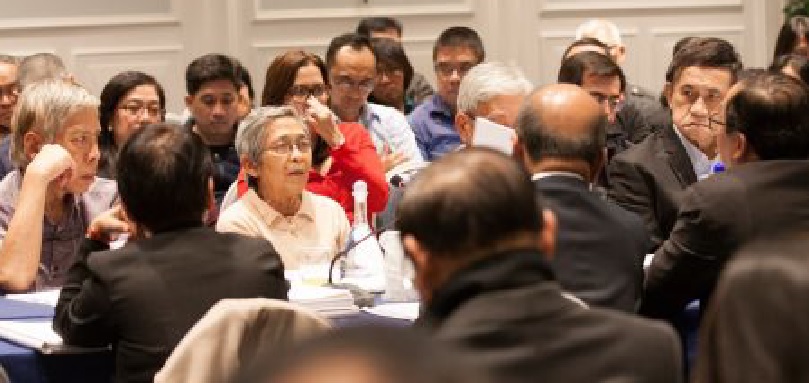NDFP RWC-SER Chairperson Julieta de Lima in a discussion during the 3rd round of peace talks
held in Rome, Italy in January 2017 / Photo: JBustamante
NDFP Media Release
23 November 2017
By Julieta de Lima
Chairperson
NDFP Reciprocal Working Committee on Social and Economic Reforms
The National Democratic Front of the Philippines (NDFP) Reciprocal Working Committee on Social and Economic Reforms (RWC-SER) views with grave concern Pres. Rodrigo Duterte’s sudden turn-about and unilateral cancellation anew of peace negotiations with the NDFP. It is the third time in six months that Pres. Duterte has obstructed the progress of the talks.
His latest scuttling of the talks comes at a time when unprecedented advances have already been achieved in forging agreements on urgently needed socio-economic reforms to alleviate mass poverty and resolve the roots of the armed conflict.
Just four days before Pres. Duterte cancelled the talks anew, the bilateral teams of the NDFP and the Government of the Republic of the Philippines (GRP) RWCs-SER initialed draft documents reflecting substantial agreements on agrarian reform and rural development, and on national industrialization and economic development. These were the result of a series of bilateral technical meetings by the NDFP and GRP RWCs-SER on October 26-27, November 9-11, and November 16-17.
The drafts include potentially significant reforms to benefit millions of Filipinos. These include the free distribution of land to tillers, farmers, farmworkers, agricultural workers and fisherfolks. Agrarian reform beneficiaries who have not yet been able to occupy the land awarded to them will be installed immediately, including those in contested lands and agricultural estates. The scope and coverage of agrarian reform will be expanded to include plantations and large-scale commercial farms covered by leasehold, joint venture, non-land transfer schemes like stock distribution option, and other such arrangements. There are also measures to prohibit and eliminate exploitative lending and trading practices.
The NDFP and GRP also agreed on the need for national industrialization and for planning to develop Filipino industrial capacity. Measures will be taken to ensure that foreign investments cease being one-sided and contribute to developing the national economy. Domestic industrialists and smaller enterprises will be protected and supported. The importance of nationalizing public utilities was affirmed. Both sides also agreed to identify key industries and priority industrial projects to jump-start industrialization. The importance of unions and workers’ councils was also acknowledged.
Further measures of even greater significance were set to be tackled. The GRP and NDFP RWCs-SER were optimistic that they would be able to complete the Comprehensive Agreement on Social and Economic Reforms (CASER) for signing by their respective negotiating panels and approval by their principals by January 2018.
The NDFP RWC-SER regrets the unilateral cancellation of talks on such vital social and economic reforms which, if implemented, would have immediately benefited tens of millions of oppressed and exploited Filipinos. The NDFP at the same time recognizes that the people’s continued daily struggles on these issues are unabated and, if anything, are made more urgent and will gain greater momentum. Pres. Duterte bears full responsibility for the failure of the talks on social and economic reforms because of his sudden turn-around and heightened hostility to the revolutionary forces and the people.###

